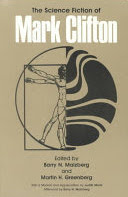Search -
The Science Fiction of Mark Clifton (Alternatives)
The Science Fiction of Mark Clifton - Alternatives
Author:
Mark Clifton published only 20 stories and 3 novels, but because he peopled his fiction with fully rounded characters, pierced idiocy and timid complacency with sardonic wit, and observed the human animal with compassion and irony, he altered forever the face of science fiction. — An innovator of the early 1950s, Clifton was one of the first to e... more »
Author:
Mark Clifton published only 20 stories and 3 novels, but because he peopled his fiction with fully rounded characters, pierced idiocy and timid complacency with sardonic wit, and observed the human animal with compassion and irony, he altered forever the face of science fiction. — An innovator of the early 1950s, Clifton was one of the first to e... more »
ISBN-13: 9780809309856
ISBN-10: 0809309858
Publication Date: 12/8/1980
Pages: 296
Rating: 2
ISBN-10: 0809309858
Publication Date: 12/8/1980
Pages: 296
Rating: 2
3.5 stars, based on 2 ratings
Publisher: Southern Illinois University Press
Book Type: Hardcover
Members Wishing: 0
Reviews: Amazon | Write a Review
Book Type: Hardcover
Members Wishing: 0
Reviews: Amazon | Write a Review
Genres:
- Literature & Fiction >> General >> Contemporary
- Science Fiction & Fantasy >> Authors, A-Z >> ( C ) >> Clifton, Mark
- Science Fiction & Fantasy >> Science Fiction >> Anthologies
- Science Fiction & Fantasy >> Science Fiction >> Short Stories




